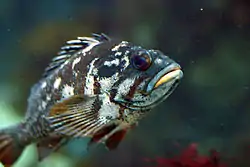Gopher rockfish
The gopher rockfish (Sebastes carnatus), also known as the gopher sea perch, is a rockfish of the Pacific coast, primarily off California.
| Gopher rockfish | |
|---|---|
 | |
| At the Monterey Bay Aquarium | |
| Scientific classification | |
| Kingdom: | |
| Phylum: | |
| Class: | |
| Order: | |
| Family: | |
| Genus: | |
| Species: | S. carnatus |
| Binomial name | |
| Sebastes carnatus (D. S. Jordan & C. H. Gilbert, 1880) | |
Gopher rockfish have a generally mottled appearance, with dark areas generally olive to reddish brown, and the lighter areas being white or sometimes pinkish. The upper part of the back almost always has three light patches extending into the dorsal fins, and the lighter areas become more extensive ventrally. They range in size up to about 40 cm.
They are known from as far north as Cape Blanco in Oregon, down to Punta San Roque in southern Baja California. They can be found in the intertidal zone, but most occur at depths of 12–80 metres, living in crevices and holes during the day, and ranging further abroad at night to feed on benthic crustacea, cephalopods, and some types of fishes. They are territorial, claiming an area of 10–12 square metres.
Gophers are extremely closely related to the black-and-yellow rockfish S. chrysomelas; S. chrysomelas is darker brown with yellow patches, and tends to prefer shallower water. While it was once thought that the black-and-yellow and gopher rockfish were merely color morphs of the same species, detailed genomic studies using microsatellite analysis have recently shown, however, that there is a significant amount of genetic difference between the two at loci that code for more than just coloration. This implies that they are indeed distinct, albeit closely related species, making them ideal specimens for studying sympatric evolution.
Genetics
A PCR-RFLP genetic sex marker has been identified for gopher rockfish, which can successfully distinguish males and females.[1][2] The marker potentially also works in the black-and-yellow rockfish,[1][2] but it does not seem to successfully distinguish males and females in various other rockfish species.[2]
References
- Fowler, Benjamin L.S.; Buonaccorsi, Vincent P. (2016). "Genomic characterization of sex‐identification markers in Sebastes carnatus and Sebastes chrysomelas rockfishes". Molecular Ecology. 25 (10): 2165–2175. doi:10.1111/mec.13594.
- Vaux, Felix; Aycock, Hannah M.; Bohn, Sandra; Rasmuson, Leif K.; O'Malley, Kathleen G. (2020). "Sex identification PCR–RFLP assay tested in eight species of Sebastes rockfish". Conservation Genetics Resources. 12: 541–544. doi:10.1007/s12686-020-01150-y.
- "Sebastes carnatus". Integrated Taxonomic Information System. Retrieved 11 March 2006.
- Milton S. Love, Mary Yoklavich, Lyman K. Thorsteinson, (2002), The Rockfishes of the Northeast Pacific, University of California Press, pp. 140–143
- Froese, Rainer and Pauly, Daniel, eds. (2006). "Sebastes carnatus" in FishBase. February 2006 version.
| Wikimedia Commons has media related to Sebastes carnatus. |
- Shawn Narum, Vincent Buonaccorsi, Carol Kimbrell, and Russell Vetter. (2004). Genetic Divergence between Gopher Rockfish (Sebastes carnatus) and Black and Yellow Rockfish (Sebastes chrysomelas). Copeia, 4, pp. 926–931.